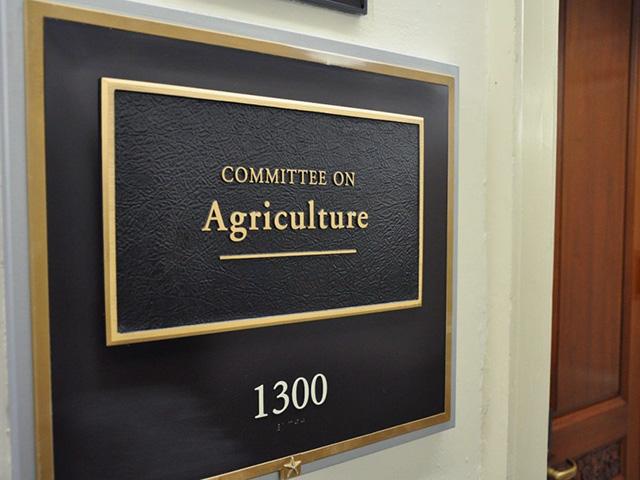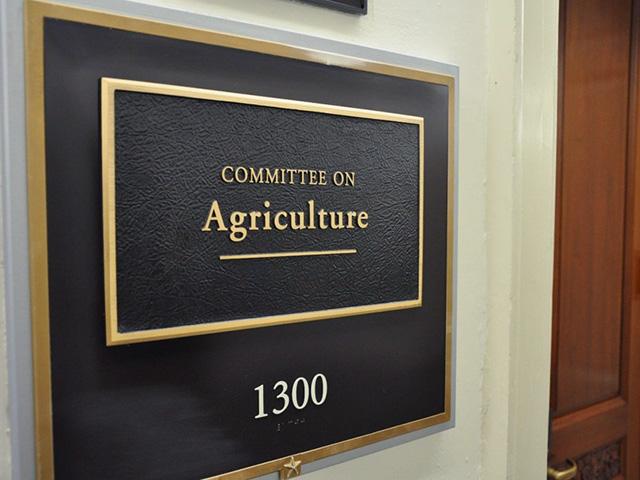Ag Policy Blog
House Ag Approves Six Bills on Bipartisan Basis
WASHINGTON, (DTN) -- The U.S. House Agriculture Committee on Wednesday advanced six bills out of committee dealing with markets and conservation on a bipartisan basis.
The bills included in this business meeting were:
- H.R. 7764, a bill to direct the Secretary of Agriculture to provide additional payments under the environmental quality incentives program for implementation of a nutrient management practice, and for other purposes;
- H.R. 2518, Producing Responsible Energy and Conservation Incentives and Solutions for the Environment Act, or the PRECISE Act;
- H.R. 2606, Sponsoring USDA Sustainability Targets in Agriculture to Incentivize Natural Solutions Act of 2021, or the SUSTAINS Act;
- H.R. 4140, Butcher Block Act;
- H.R. 7675, to amend the Department of Agriculture Reorganization Act of 1994 to establish an Agricultural and Food System Supply Chain Resilience and Crisis Response Task Force, and for other purposes;
- H.R. 7606, Meat and Poultry Special Investigator Act of 2022.
House Agriculture Committee Chairman David Scott, D-Ga., said in a news release, "Today's package of important bills is a great step in our efforts to provide stable and fair markets for our agriculture producers and consumers. This bipartisan group of bills will collectively address high prices facing our agriculture producers and our nation's consumers.
"These bills give USDA the appropriate tools to identify and correct problems in our supply chain and give producers the tools to ease the impact of fertilizer prices and availability.
P[L1] D[0x0] M[300x250] OOP[F] ADUNIT[] T[]
"Furthermore, this legislative package encourages local and regional meat processing capacity while also addressing the anti-competitive practices in the industry, to ensure a robust and resilient domestic and international food supply that will lower prices for consumers.
"There are a multitude of reasons why costs for agriculture producers and consumers have gone up, and those issues cross the jurisdiction of several House committees. Today's group of bills addresses the areas within our jurisdiction, and we will continue to work with our other committees to help in areas impacting our great agriculture economy," Scott concluded.
Rep. Angie Craig, D-Minn., said the Strengthening the Agriculture and Food Supply Chain Act she introduced with Rep. Dusty Johnson, R-S.D., and others would create a task force at the Agriculture Department that would be responsible for evaluating the stability and reliability of the agriculture and food system as well as identifying specific recommendations to improve the security, safety and resilience of the supply chain. The task force would be required to submit a report detailing its work and recommendations to Congress no later than 270 days after the enactment of the bill.
"Right now, Americans are justifiably frustrated by the higher prices they're experiencing – whether that's families checking out at the grocery store or farmers and business owners struggling with higher input costs," said Craig. "In Congress, we must take immediate action to get products from ships to shelves faster – and to rebuild and strengthen our supply chains for future generations. I'm proud to see this commonsense legislation receiving bipartisan support, and urge final consideration on the House floor as soon as possible."
Rep. Abigail Spanberger, D-Va., said the Meat Packing Special Investigator Act she sponsored would establish a new Office of the Special Investigator for Competition Matters within the Agriculture Department's Packers and Stockyards Division. This new USDA special investigator would focus on preventing shortages, enforcing America's anti-trust laws, and holding bad actors in the meat and poultry industry accountable, she said.
Rep. Mariannette Miller-Meeks, R-Iowa, co-sponsored Spanberger's bill.
Their legislation is the companion bill to legislation introduced by Sens. Jon Tester, D-Mont.; Chuck Grassley, R-Iowa; and Mike Rounds, R-S.D.
The Virginia Cattlemen's Association and the National Farmers Union praised the Meat Packing Special Investigator Act.
"Virginia Cattlemen's Association policy supports efforts to ensure a free, private enterprise-driven and competitive marketing system for cattle. We thank Congresswoman Spanberger for her efforts to bring needed transparency, common sense, and accountability to our industry through the Meat and Poultry Special Investigator Act," said Brandon Reeves, executive director of the Virginia Cattlemen's Association.
"Passage of this bill is a priority for National Farmers Union (NFU) and our Fairness for Farmers campaign," said NFU President Rob Larew. "Laws intended to protect markets from monopolies and anti-competitive practices in agriculture are not being adequately enforced. Greater enforcement of competition laws by USDA will better ensure America's independent family farmers and ranchers have a chance to succeed in today's marketplace, now dominated by monopolies. While there are many more measures needed to ensure a fair marketplace, the action during this week's House Agriculture Committee markup is a big step forward."
The National Cattlemen's Beef Association (NCBA) condemned the bill as "unfunded and duplicative."
"Cattle producers strongly support effective oversight of the meatpacking sector, but the special investigator bill does nothing to accomplish that goal. Rather than focusing on adequate staffing and funding for the woefully under-resourced Packers and Stockyards Division at USDA, this hasty proposal was rushed through the legislative process without consideration of the confusing bureaucratic mess it would create. Arming USDA with unchecked subpoena and prosecutorial power while significantly undercutting the Department of Justice's role in the process is poor practice," said NCBA Vice President of Government Affairs Ethan Lane.
The committee also approved the Butcher Block Act, which Spanberger and Johnson introduced. Spanberger said the bill "would help rebalance the U.S. cattle market by easing regulatory barriers and improving access to meat processing grants for small processors."
Rep. Glenn "GT" Thompson, R-Pa., noted that the committee approved two Republican-led bills: H.R. 2606, the Sponsoring USDA Sustainability Targets in Agriculture to Incentivize Natural Solutions, or SUSTAINS Act; and H.R. 2518, the Producing Responsible Energy and Conservation Incentives and Solutions for the Environment, or PRECISE Act.
The bills were introduced by Thompson and Rep. Ashley Hinson, R-Iowa, respectively. Both bills advanced through committee by unanimous consent, Thompson noted.
"Agriculture Republicans are promoting a stronger rural economy by growing climate-friendly innovations that are already being carried out by producers. The SUSTAINS Act, my bill which encourages private-sector partnerships with USDA to engage producers in supporting conservation initiatives, will be a big step forward in reducing our carbon footprint while increasing productivity," Thompson said.
"I'm glad my PRECISE Act was passed out of the House Agriculture Committee with overwhelming bipartisan support," said Hinson. "This legislation will make it easier for Iowa farmers to access precision agriculture technology through USDA programs they already know and trust. My PRECISE Act will empower farmers with the tools they need to increase crop yields while lowering input costs and environmental impacts."
- House Agriculture Committee markup, part two (video) https://www.youtube.com/…
- Bills considered at meeting https://agriculture.house.gov/…
Jerry Hagstrom can be reached at jhagstrom@nationaljournal.com
Follow him on Twitter @hagstromreport
(c) Copyright 2022 DTN, LLC. All rights reserved.





Comments
To comment, please Log In or Join our Community .